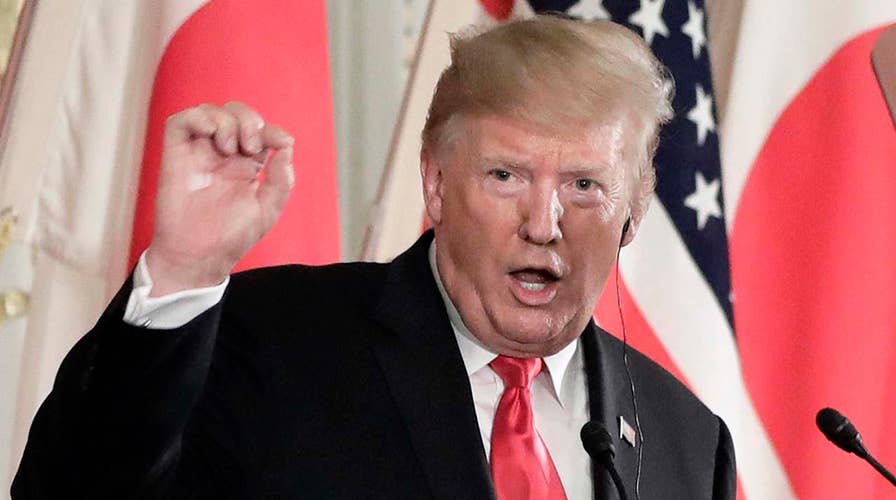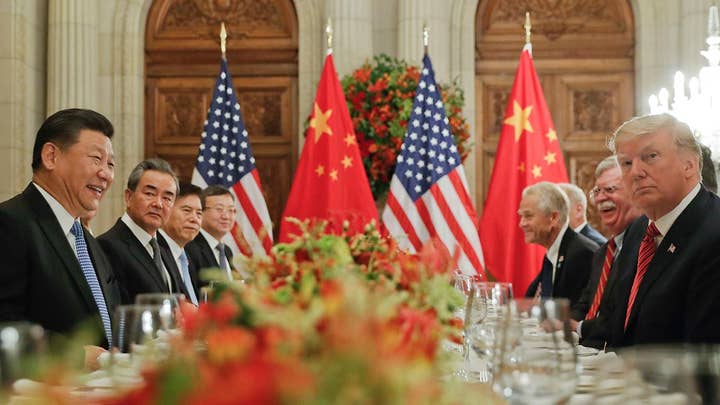yTrump: US is not ready for trade deal with China
President Trump has threatened an additional round of tariffs on Chinese exports as trade talks stall. Insight from Gene Marks, president of the Marks group.
Most Americans – and many members of Congress – have no idea just how badly the world cheats us with high tariffs and nonreciprocal trade. That's why I recommend everybody read the just-released eye-opening report from the White House Office of Trade and Manufacturing Policy.
Stunningly, this report finds that across more than 100 countries stretching from Argentina, Brazil, and Chile to China, India, and Vietnam, American farmers, ranchers, and manufacturers face systematically higher tariffs on their exports than foreign competitors face when exporting to America. Astonishingly, these nonreciprocal tariffs are perfectly legal under the unfair rules of the broken-down World Trade Organization (WTO).
Take autos for example. The U.S. levies a tariff of only 2.5 percent on foreign imports but the European Union (EU) erects a tariff barrier four times higher – all with the WTO’s blessing! No wonder we’re inundated with Audis and Beemers and VWs. Even when German automakers build assembly plants here in the U.S., they still manufacture the high value-added, high-wage parts like engines and transmission on German soil.
CHINA 'COMMITTED' TO FORGING NEW TRADE DEAL WITH TRUMP, COUNTRY'S AMBASSADOR TELLS FOX NEWS
It’s not just in manufactured goods where America is getting robbed by high nonreciprocal tariffs. When an Arkansas or Louisiana rice farmer tries to export to Malaysia, it’s a 40 percent tariff. Pennsylvania and Wisconsin dairy farmers face a 67 percent European tariff. And South Carolina green tea exported to Thailand faces a 90 percent tariff.
These high nonreciprocal tariffs mean more factories and jobs offshore and less investment and growth in the U.S. than we otherwise could achieve. That’s why in his 2019 State of the Union address, President Trump urged Congress to pass the United States Reciprocal Trade Act (USRTA).
Introduced by Rep. Sean Duffy. R-Wis., last January, the USRTA would give the president the authority to raise tariffs to reciprocal or “mirror” levels if foreign countries refuse to lower their tariffs to U.S. levels. Ask any American on Main Street if he or she thinks this is a good idea, and most are likely to answer "yes."
A nationwide Harvard-Harris poll found that 81 percent of respondents support the USRTA, with little partisan difference. If members of Congress voted the views of Main Street rather than their Wall Street donors, the USRTA would pass by a similar or greater margin.
Of course, I’m not going to hold my breath on that possibility. Unlike President Trump, Congress has been out of touch with the American people on the trade issue for decades. How else do you explain the fact that Congress as an institution gave us three of the worst trade deals in American history – the 1994 North American Free Trade Agreement (NAFTA), China's entry into the WTO in 2001, and the 2012 South Korean free-trade agreement?
How would Congress passing the USRTA benefit America? The new White House report estimates that over $50 billion would be shaved off the trade deficit. With about 6,000 new jobs created per billion dollars of trade deficit reductions, this would lead to more than 300,000 new jobs created.
A lower trade deficit would also mean faster growth from fewer imports, more domestic production, and more exports. In the first quarter of 2019, the real gross domestic product grew at a rate of 3.2 percent. One point of that growth was due to a more favorable trade balance – primarily because of the China tariffs.
The new White House report also finds that the auto and agricultural sectors would benefit the most from passage of the USRTA. Both sectors would see a jump in exports by almost 10 percent.
These findings by the White House underscore why we need to let Trump be Trump on trade policy so he can level the international playing field and fix the broken World Trade Organization policies. The USRTA would provide him with an important new tool, and both sides of the congressional aisle should stop playing petty politics and put the American worker first by passing this legislation immediately.










































